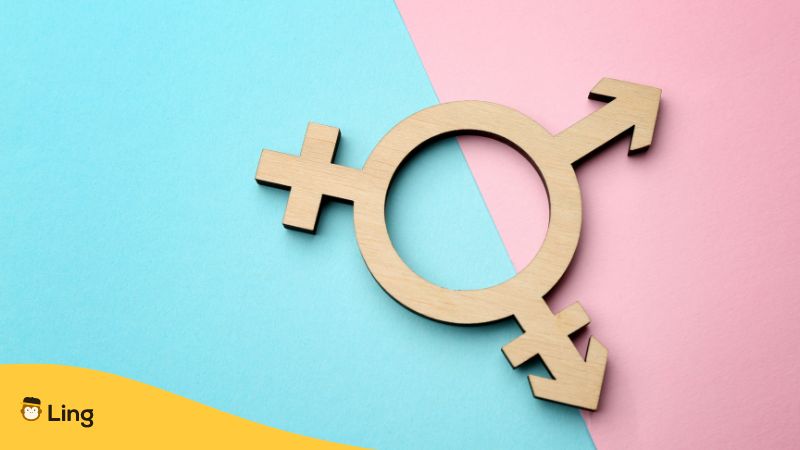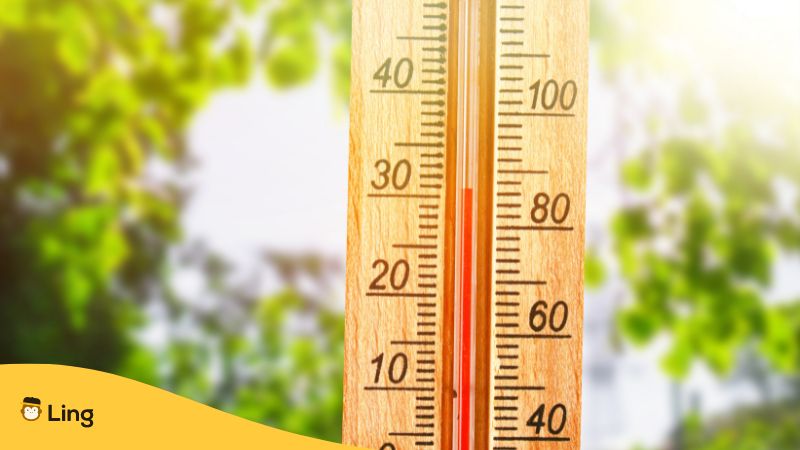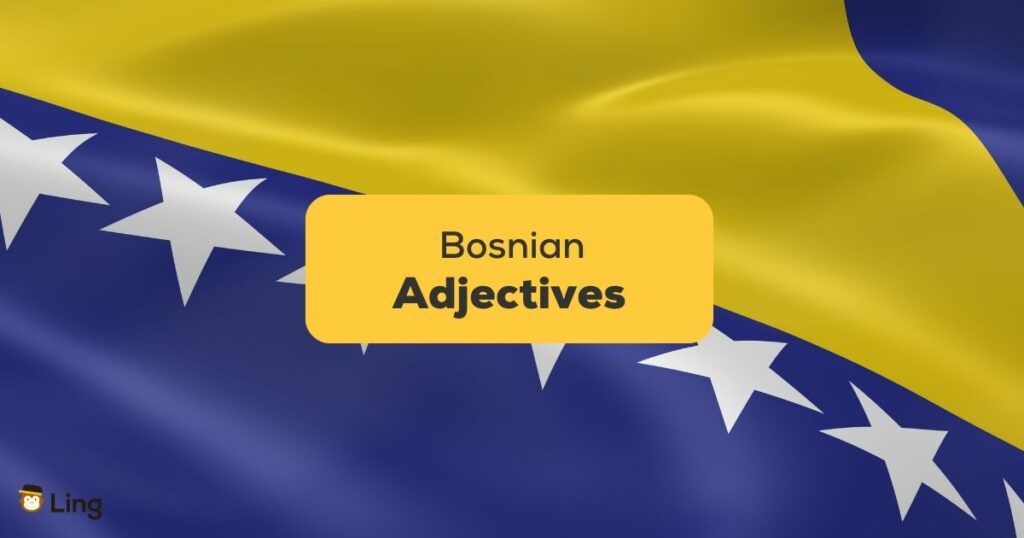Have you ever wanted to sprinkle your sentences with a touch of Bosnian adjectives that paint vivid pictures in the minds of your listeners? Look no further, for Bosnian adjectives are your linguistic palette. From describing a cozy coffee shop on a rainy day to expressing the charisma of a historical site, these adjectives are the secret sauce that adds flavor, flair, and fascination to your language journey. Let’s begin this lesson on Bosnian adjectives and unravel the mysteries of their forms, usage, and charm!
What Are Adjectives?
But wait: before we begin our Bosnian journey, let us make sure that we are on the same page on what an adjective is.
An adjective is a word that adds details to nouns or noun phrases. It describes qualities, characteristics, or quantities of nouns, like “blue sky” or “happy person.” Adjectives can come before or after nouns and help provide a clearer picture or understanding of the subject by giving it “color.”
How To Use Them?
Let’s continue to have a lesson about its proper uses. This is important to avoid any grammatical errors when using Bosnian adjectives. Shall we? Let’s begin this Bosnian grammar lesson!
The Sequence Of Adjectives
While gender and number agreement form the foundation, the sequence of adjectives further refines your Bosnian expressions. Adjectives are placed either before or after the noun, and the sequence is determined by their inherent characteristics. Generally, the order flows from more general to more specific qualities. For example, you’d say “veliki crveni automobil” (big red car) – the general size comes before the specific color.

Gender Agreement
In Bosnian, adjectives adhere to the gender of the nouns they modify. This agreement ensures that your sentences are grammatically correct and coherent. Whether you’re describing a masculine noun or a feminine noun, Bosnian adjectives adapt seamlessly.
Masculine: Imagine you’re describing a brave knight (vitez). The adjective “brave” (hrabar) dons its masculine attire and becomes “hrabar vitez.” It’s like they’re preparing to embark on a heroic quest together, perfectly matched in gender harmony.
Feminine: Now, let’s stroll through a blooming garden with a fragrant rose (ruža). The adjective “fragrant” (mirisan) elegantly transforms to “mirisna ruža,” channeling the delicate allure of the feminine world.
Neuter: As the sun sets over a serene landscape, the adjective “peaceful” (miran) captures the mood. A peaceful day (dan) becomes “miran dan,” creating a soothing, neuter ambiance.
Number Agreement
Just as adjectives adjust to gender, they also accommodate the number of nouns. Whether you’re talking about one object or a group of them, adjectives gracefully change to match. When describing singular nouns, the adjective maintains its regular form. However, when dealing with plural nouns, the adjective might undergo slight modifications to agree in number. For instance, a beautiful city (grad) becomes “lijep grad,” while beautiful cities (gradovi) become “lijepi gradovi.”

Degrees Of Comparison
Bosnian adjectives are versatile wordsmiths that offer degrees of comparison—positive, comparative, and superlative. These degrees allow you to convey different levels of intensity, from simple descriptions to emphasizing the highest degree of quality. For instance, “lijep” (beautiful) becomes “ljepši” (more beautiful) in comparative form and “najljepši” (most beautiful) in superlative form. Here are some examples of Bosnian adjectives and their degrees:
| Positive Form | Comparative Form | Superlative Form |
| Big (veliki) | Bigger (veći) | Biggest (najveći) |
| Beautiful (lijep) | More Beautiful (ljepši) | Most Beautiful (najljepši) |
| Strong (jak) | Stronger (jači) | Strongest (najjači) |
| Fast (brz) | Faster (brži) | Fastest (najbrži) |
| Happy (sretan) | Happier (sretniji) | Happiest (najsretniji) |
| Old (star) | Older (stariji) | Oldest (najstariji) |
| Good (dobar) | Better (bolji) | Best (najbolji) |
| Small (mali) | Smaller (manji) | Smallest (najmanji) |
| Funny (smiješan) | Funnier (smješniji) | Funniest (najsmješniji) |
| Clever (pametan) | Cleverer (pametniji) | Cleverest (najpametniji) |

Word Order For Emphasis
Emphasizing specific aspects within a sentence is another aspect of Bosnian adjective usage. Placing the adjective before the noun often highlights that quality, while placing it after the noun is more common and neutral. So, “crven (adjective) cvijet” (red flower) emphasizes the color, while “cvijet crven (adjective)” (flower red) maintains a balanced focus.
15 Bosnian Adjectives!
Let us see real-life sentences with Bosnian adjectives and the principles that we’ve learned. Are you ready? Check out the table below!
| English | Bosnian | Sentence | English Translation |
| Big | Veliki | Gledali smo veliki vatromet na nebu. | We watched a big fireworks display in the sky. |
| Beautiful | Lijep | Šetali smo pored lijepe rijeke. | We strolled by a beautiful river. |
| Funny | Smiješan | Tvoja priča me uvijek nasmije. | Your story always makes me laugh. |
| Fast | Brz | Trkač je bio toliko brz da je gotovo odletio. | The runner was so fast he almost flew. |
| Colorful | Šaren | Vidjeli smo šarene ptice u parku. | We saw colorful birds in the park. |
| Delicious | Ukusan | Ovaj kolač je stvarno ukusan! | This cake is really delicious! |
| Smart | Pametan | Naša mačka je zaista pametna, otvara vrata. | Our cat is really smart, it opens doors. |
| Happy | Sretan | Osjećam se sretno kad vidim cvjetne livade. | I feel happy when I see flowery meadows. |
| Old | Star | U posjeti smo bili prelijepom starom gradu. | We visited a beautiful old city. |
| Quiet | Tih | Noću je vrt pun tihog cvrkuta. | At night, the garden is full of quiet chirping. |
| Cold | Hladan | Zimi je vani zaista hladno. | It’s really cold outside in the winter. |
| Busy | Zauzet | Tvoj dan zvuči jako zauzet! | Your day sounds very busy! |
| Sweet | Slatkast | Ovaj čaj ima slatkast okus. | This tea has a slightly sweet taste. |
| Soft | Mehak | Tvoja deka je tako mehka i udobna. | Your blanket is so soft and cozy. |
| Strong | Jak | Vidjeli smo jakog čovjeka kako podiže teške stvari. | We saw a strong man lifting heavy things. |
And there you have it: a table full of delightful Bosnian adjectives and their sentences!
As with any language skill, practice is key. Engaging in conversations, reading, and writing exercises will gradually refine your instinct for using Bosnian adjectives appropriately. Whether it’s to describe something big, beautiful, or clever, these adjectives know how to take language to exciting heights! So go out there and sprinkle some adjective magic – your Bosnian adventures await!
More Bosnian!
You can have a full lesson by getting Ling for FREE! The Ling app offers a range of engaging features tailored for learning Bosnian, including bite-sized lessons with native speaker audio, interactive quizzes, and writing practice. With its immersive approach and user-friendly interface, mastering Bosnian has never been more accessible and enjoyable! Download it now on Play Store or App Store! See you in the next lesson!





























































